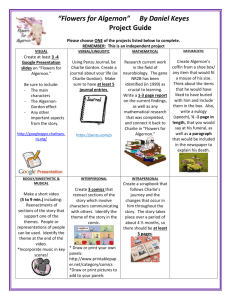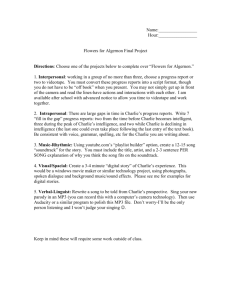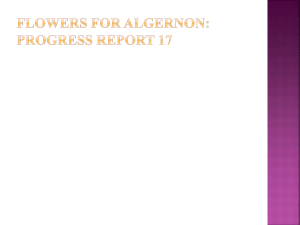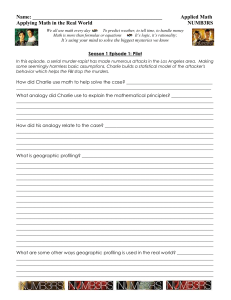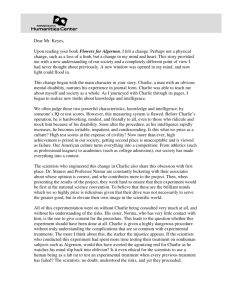Flowers for Algernon
advertisement
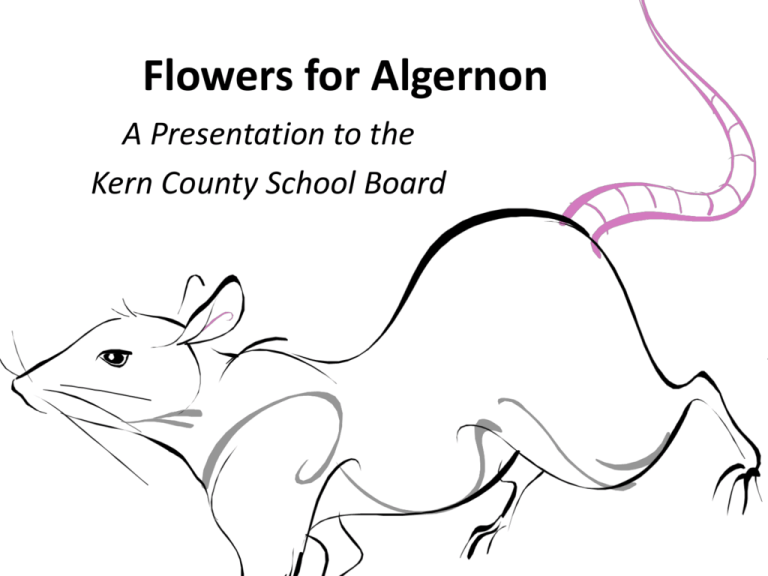
Flowers for Algernon A Presentation to the Kern County School Board Setting • New York City – Charlie’s Apartment – Donner’s Bakery – Beckman College • Chicago – psychology convention Key Players • Charlie Gordon (protagonist) – – 32 years old, mentally retarded – Works at Donner’s Bakery and lives in NY – Had an experimental operation to improve his intelligence • Miss Kinnian – Charlie’s teacher at the Beckman special school for retarded adults – Recommends Charlie as a candidate for the experiment – Charlie loves her, and she cares for him. • Fay – Charlie’s unconventional neighbor – a free-spirited artist who loves dancing and sleeping around – Has a fling with Charlie Key Players cont. • Rose Gordon – Charlie’s mom – initially denies his retarded state and tries to make him normal – Later rejects him completely when she has a “normal” child • Norma Gordon – Charlie’s sister – Embarrassed of him, and treats him cruel • Matt Gordon – Loves Charlie and accepts him for who he is – Not very strong; doesn’t always defend Charlie – Takes him to his brother’s when Rose pulls out a knife on Charlie • Harold Nemur & Jay Strauss – The doctor and psychiatrist who operated on Charlie Plot Charlie becomes smarter than the doctors. He falls in love with Alice, and she falls for him too. He learns Algernon had the same operation. He competes w/the mouse Algernon at mazes and gradually gets smarter. Exposition: Charlie is 32 and works at a bakery. He gets an operation to make him smarter. He begins writing progress reports. Climax: At the convention, Charlie learns Algernon is regressing, which foreshadows his own regression. Charlie runs away from the convention and gets his own apartment.. He has a fling with Fay, starts drinking, and neglects his work.. Algernon dies. Charlie discovers AlgernonGordon effect. Alice is there for him as he slowly regresses and becomes more aggressive. Resolution: Charlie checks himself into the Warren State Home. Book Banning • 3,019 challenges between 1/1/00 and 12/31/05 (ALA) • Roughly 85% of challenges go unreported (Kidd) • “Books that inspire may also offend.” (Lee as cited by Strothman & Van Fleet) • Censorship presents obstructions to a clear view of the world (Boyd & Bailey) • Usually challenged for social, sexual, political, or religious content (Strothman & Van Fleet) • More often than not, books are challenged due to a word, an isolated concept, or mention of lifestyles someone finds offensive (Boyd & Bailey) • Example: Mother who wanted to ban Briar Rose in 1994 only read one page (Boyd &Bailey) Algernon Challenged • 1976 – Plant City Public Schools (FL) – Banned due to “references to sex” and encounter between Charlie and his teacher • 1977 – Cameron County School District (PA) – Banned from classrooms; called “sexually oriented trash” • 1981 – Glenn Rose High School Library (AR) and “explicit” • 1983 – Oberlin High School (OH) – Banned for same reasons as Glenn Rose Algernon Challenged Cont. • 1984 – Glenrock High School (WY) – Banned as required reading because “explicit love scenes were distasteful” • 1986 – Charlotte Mecklenberg School District (NC) – removed from 10th grade supplemental reading list because parents charged that the book was pornographic • 1996 – Yorktown School District (VA) – Parent complained about profanity and references to sex and drinking • 1997 – Rabun County (GA) – Removed from 9th grade curriculum because it was “inappropriate” for grade level Valuable Life Lessons • Book banning hides ideas that are important for deepening concepts, seeing from different perspectives, and understanding universal qualities of humans and events (Boyd&Bailey) • Some life lessons from Algernon 1. Mentally disabled people are often mistreated, sometimes even by their own family as Charlie was mistreated by his mom and sister. 2. Charlie felt like doctors thought he wasn’t human until the operation, but mentally disabled people are human beings too and deserve to be treated as such. 3. Charlie and the waiter didn’t realize when they were being laughed at, so mentally challenged need people to stick up for them if they are being mistreated. Mitigating Measures • Mitigating Measures: 1. A copy of the book is given to parents to read the book first . 2. A list of sensitive issues and topics for discussion are sent to parent. 3. Parents must sign a permission slip for child to read book. 4. Alternative book is offered. 5. School nurse comes to classroom to talk about dangers of unprotected sex. Support Free Speech! “freedom of unrestricted access to info. and ideas regardless of communication medium used, content of work, and viewpoints of author and receiver” (ALA 2008) • Let our children learn some valuable life lessons. • It will make their world a little larger. • Maybe next time they encounter a mentally challenged person, they will be more likely to help and/or defend them. Works Cited Boyd, Fenice B., and Nancy M. Bailey. “Censorship in Three Metaphors.” Journal of Adolescent & Adult Literacy 52:8 (2009): 653-661. Academic Search Premier. Ebsco Host. Web. 22 Mar. 2012. Doyle, Robert. “Flowers for Algernon.” Banned Books: Challenging Our Freedom to Read. Chicago: American Library Association. 237. 2010. Print. Kidd, Kenneth. “’Not Censorship but Selection’: Censorship and/as Prizing.” Children’s Literature in Education 40:3 (2009): 197-216. Academic Search Premier. Ebsco Host. Web. 22 Mar. 2012. Sova, Dawn B. “Flowers for Algernon.” Banned Books: Literature Suppressed on Sexual Grounds. NewYork: Facts on File, Inc. 2006. 72-73. Print. Strothmann, Molly, and Connie Van Fleet. “Books That Inspire, Books That Offend.” Reference & User Services Quarterly 49:2 (2009): 163-179. Academic Search Premier. Ebsco Host. Web. 22 March 2012.
